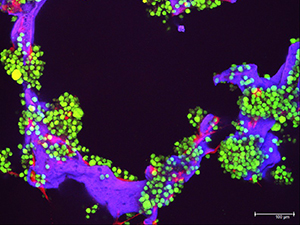Targeting Multiple Myeloma
The U.S. FDA approved a monoclonal antibody and enzyme combination for use in conjunction with chemotherapy and a steroid to treat patients with multiple myeloma.
The U.S. Food and Drug Administration (FDA) approved the monoclonal antibody daratumumab combined with the enzyme hyaluronidase-fihj (Darzalex Faspro) to be used along with chemotherapy and a steroid for certain patients with multiple myeloma.

The approval of daratumumab and hyaluronidase-fihj along with the chemotherapy pomalidomide (Pomalyst) and the steroid dexamethasone is intended for patients with multiple myeloma who have received at least one prior line of therapy.
Monoclonal antibodies are proteins that help the immune system recognize specific targets. Daratumumab binds to CD38, a receptor that is highly expressed on the surface of myeloma cells. Hyaluronidase-fihj is an enzyme that breaks down hyaluronic acid, a naturally occurring molecule that boosts cancer cell growth.
The efficacy of the treatment regimen was evaluated in an open-label, active-controlled clinical trial. Patients treated with the approved regimen had a progression-free survival of 12.4 months as compared with 6.9 months among patients treated with pomalidomide alone.
Multiple myeloma is a form of blood cancer that affects the bone marrow. The National Cancer Institute estimated that nearly 35,000 people living in the United States would be diagnosed with multiple myeloma in 2021.
The FDA decision was rendered on July 9, 2021.
